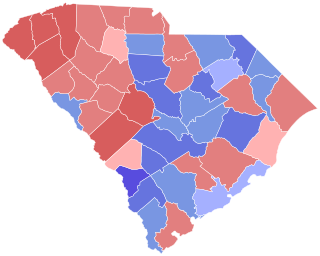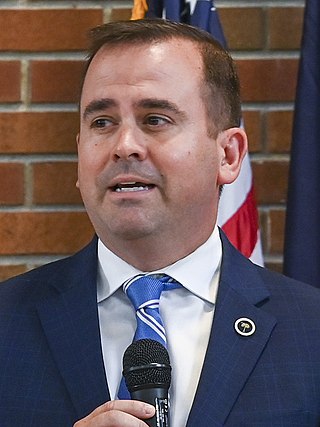
The 2006 South Carolina gubernatorial election took place on November 7, 2006. Incumbent Republican Governor Mark Sanford won re-election against Democratic State Senator Tommy Moore, becoming only the third Republican governor in South Carolina to win a second term. Sanford started the campaign with a double-digit edge over Moore and he maintained that lead to election day. During the campaign, Sanford's approval rating averaged in the mid-fifties. In Sanford's re-election victory, he also garnered 22% of the African American vote.

Piedmont Technical College is a public community college with its main campus in Greenwood, South Carolina. It serves seven counties in the Lakelands region of South Carolina. Six additional County Centers also serve students in Abbeville County, Edgefield County, Laurens County, McCormick County, Newberry County, and Saluda County. Piedmont Technical College serves the largest geographic area of any institution in the South Carolina Technical College System. The college was founded in 1966.

South Carolina's 3rd congressional district is a congressional district in western South Carolina bordering both Georgia and North Carolina. It includes all of Abbeville, Anderson, Edgefield, Greenwood, Laurens, McCormick, Oconee, Pickens, and Saluda counties and portions of Greenville and Newberry counties. The district is mostly rural, but much of the economy revolves around the manufacturing centers of Anderson and Greenwood. With a Cook Partisan Voting Index rating of R+21, it is the most Republican district in South Carolina.

There are currently seven United States congressional districts in South Carolina. There have been as few as four and as many as nine congressional districts in South Carolina. The 9th district and the 8th district were lost after the 1840 census. The 5th district and the 6th district were also briefly lost after the Civil War, but both had been regained by the 1880 census. Because of the state population growth in the 2010 census, South Carolina regained its 7th district, which had remained unused since the Civil War.

Prior to 1865, the Governor of South Carolina was chosen by the General Assembly. The Constitution of South Carolina provided for the voters of South Carolina to choose the governor; James Lawrence Orr was the first elected governor of South Carolina. The following is a list of gubernatorial election results for the state of South Carolina:

The 1946 South Carolina gubernatorial election was held on November 5, 1946 to select the governor of the state of South Carolina. Strom Thurmond won the contested Democratic primary and ran unopposed in the general election becoming the 103rd governor of South Carolina.

The 2010 South Carolina gubernatorial election took place on November 2, 2010. Incumbent Republican Governor Mark Sanford was term limited and unable to seek re-election. Primary elections took place on June 8, 2010, and a runoff election, as was necessary on the Republican side, was held two weeks later on June 22.
Thomas C. Alexander is an American businessman who is currently serving as the President of the South Carolina Senate. Since 1996, he has served S.C. Senate District 1 as a Republican. Alexander served as an honorary chair of the 2023 Inauguration Committee for Governor Henry McMaster.

The 2002 United States Senate election in South Carolina was held on November 5, 2002. Longtime Republican incumbent Strom Thurmond decided to retire at the age of 100, becoming the first centenarian to ever serve in Congress; he later died in June 2003. Thurmond's record as the longest-serving Senator in U.S. history was later surpassed by West Virginia's Robert Byrd.

The 2004 United States Senate election in South Carolina was held on November 2, 2004. Longtime incumbent Democratic U.S. Senator Fritz Hollings retired, and Republican U.S. Representative Jim DeMint won the open seat. DeMint was the first Republican to hold this Senate seat since 1879, and the first Republican to ever be popularly elected to the seat.

The 2008 South Carolina Senate election were held on Tuesday, November 4, 2008. The primary elections were held on June 10 and the runoff elections were held two weeks later on June 24. The current composition of the state delegation is 27 Republicans and 19 Democrats. Senators are elected for four-year terms, all in the same year.
Thomas L. Moore is a South Carolina businessman and former state politician who is now an executive of a payday lending association in Washington, D.C. Moore was the Democratic nominee for Governor of South Carolina in 2006, but lost to incumbent Republican Governor Mark Sanford.

Neal Collins is a Republican member of the South Carolina House of Representatives, representing the 5th district. He was first elected in 2014, and re-elected in every subsequent election. In 2010, he was one of several candidates running for the open seat of 3rd congressional district of South Carolina in the House of Representatives, which was held by J. Gresham Barrett, but left to compete in the 2010 Gubernatorial election for the Governor of South Carolina.

The 2014 South Carolina gubernatorial election took place on November 4, 2014, to elect the Governor of South Carolina, concurrently with the regularly-scheduled election and special election to both of South Carolina's U.S. Senate seats, as well as other elections to the United States Senate in other states and elections to the United States House of Representatives and various state and local elections.

The 2014 United States Senate election in South Carolina took place on November 4, 2014, concurrently with a special election for South Carolina's other Senate seat, as well as other elections to the United States Senate in other states and elections to the United States House of Representatives and various state and local elections.

The 1976 United States presidential election in South Carolina took place on November 2, 1976. All 50 states and the District of Columbia were part of the 1976 United States presidential election. South Carolina voters chose eight electors to the Electoral College, who voted for president and vice president.

These six off-year races featured special elections to the 113th United States Congress to fill vacancies due to resignations in the United States House of Representatives. Two were due to Congressmen taking seats in the United States Senate, one resigned to take jobs in the private sector, one resigned to take a job in the public sector, and one resigned due to an impending federal indictment regarding misuse of campaign funds.

The 2016 South Carolina Senate elections took place as part of the biennial United States elections. South Carolina voters elected state senators in all 46 districts. State senators serve four-year terms in the South Carolina Senate, with all the up for election each cycle.

The 2020 South Carolina State Senate elections took place as part of the biennial 2020 United States elections. South Carolina voters elected state senators in all 46 senate districts. State senators serve four-year terms in the South Carolina Senate, with all of the seats up for election each cycle. The primary elections on June 9, 2020, determined which candidates appeared on the November 3, 2020, general election ballot.

The 2012 South Carolina Senate elections were held on Tuesday, November 6, 2012. The primary elections were held on June 12 and the runoff elections were held two weeks later on June 26. The current composition of the state delegation is 28 Republicans and 18 Democrats. Senators are elected for four-year terms, all in the same year.























